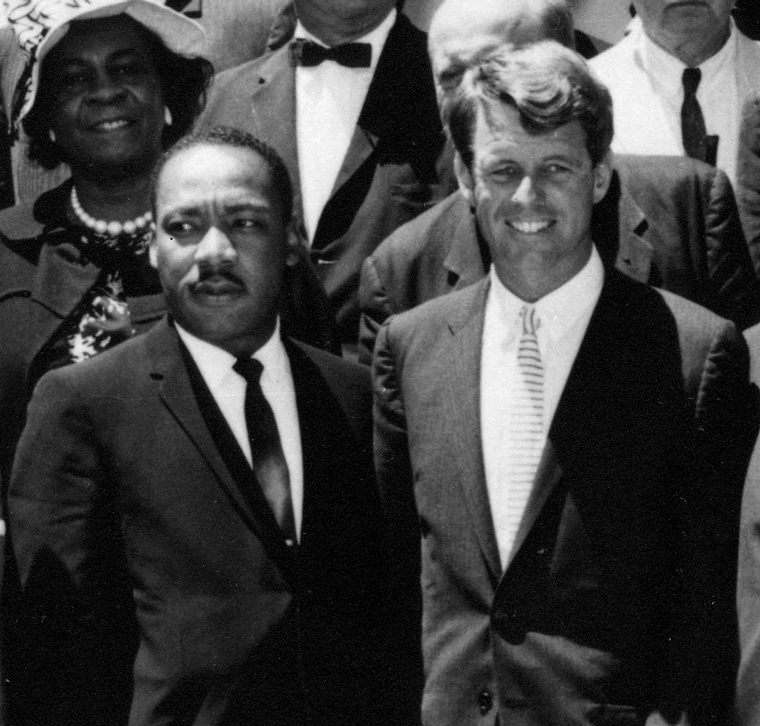Opinion: The Ruthless Man

Civil Rights Leaders meet with the Vice President, Attorney General, and other officials (Abbie Rowe, National Park Service/John Fitzgerald Kennedy Library, Boston)
By Christopher Condon, Columnist
Recently, a documentary was released entitled “Bobby Kennedy for President.” Predictably, the film focuses on the career of Robert Kennedy, beginning with his role as a campaign manager for his brother John and ending with a discussion of his legacy in the contemporary era. More specifically, it traces the journey of Kennedy toward the realization of the ideals he strived to achieve for his entire career.
In light of the 50th anniversary of Robert Kennedy’s assassination on June 6th, perhaps it is well to examine what Kennedy’s legacy means to all of us, and its significance to the United States as a whole. Robert Kennedy, from a young age, garnered a reputation as the meekest and most thoughtful of his brothers.
In a family of powerful personalities and ambition, it is easy to be overlooked as a simple footnote of an otherwise storied family history, towered over by diplomats and presidents alike. However, Robert used his thoughtfulness and drive to overcome the seemingly insurmountable intimidation of his self-assured older brothers, striving only for what he was taught as a boy: to achieve victory.
As a campaign manager and as an attorney for various congressional committees, Kennedy gained a reputation as a “ruthless man.” In his pursuit of organized crime in Congress and in the Justice Department, his tenacity was legendary and constant. In his advocacy for important causes in these same positions, his perseverance was a ubiquity.
Upon his brother’s assassination in 1963, Robert Kennedy found that in the Johnson administration, his ideals and work were of little use in advocacy for the causes that were so important to him.
Subsequently, he campaigned for and was elected to the United States Senate in 1964. Therein, as a freshman senator from New York, Kennedy was able to engage with issues that were of importance in his view not only to himself, but to the moral fiber of the nation. As an advocate for poverty alleviation, he spoke to less affluent citizens from coast to coast, from Bedford Stuyvesant to the Mississippi Delta to rural Kentucky. In his efforts for legal equality for farm workers, he traveled across the sun-kissed plains of the west to speak directly to those who were affected most by low wages and deplorable living conditions. In advocating for peace in Vietnam he confronted the most powerful actors in American politics, challenging the very President whom he had once served as Attorney General of the United States.
Once it became clear that the circumstances he fought to alter would remain constant if more radical action was not taken, Kennedy decided to campaign for the presidency in 1968. Reviving the energetic spirit of his brother, the Kennedy campaign circled the nation for months, touching thousands of lives and rising to the utmost prominence from the shade of obscurity.
Robert Kennedy’s American crusade embodied the ripple of hope that arose from the hearts and minds of an awoken people; it was within Robert Kennedy that the aspirations of a nation rested. After achieving victory in the California Democratic primary election of 1968, however, that hope was met with the cruel and cold hand of fate in a hotel kitchen.
Upon the death of Martin Luther King Jr., Kennedy had appealed to the magnanimity of the human spirit, pleading with a wounded nation to not lash out in anger.
Speaking to a crowd writhing with pain, he only hoped the words his favorite poet could pacify the desire for revenge: “Even in our sleep, pain which cannot forget falls drop by drop upon the heart, until in our own despair, against our will, comes wisdom through the awful grace of God.”
The so-called “ruthless man” believed that through tragedy and despair, we may garner the fortitude to overcome our greatest obstacles and challenges.
In truth, the assassination of Robert Kennedy in the kitchen of The Ambassador Hotel cannot extinguish the cause for which he advocated. Above all, Kennedy believed in the common humanity of man, and that it is the duty of all human beings to treat each other with dignity and respect.
In seeking peace, in seeking prosperity, in seeking solutions for the greater good, our work is never done. Although he often shunned his reputation as a ruthless man, Robert Kennedy’s tenacity in fighting injustice whenever and wherever it exists is perhaps the keystone of his legacy. In pursuit of what is righteous, ruthlessness is invariably the just course.
